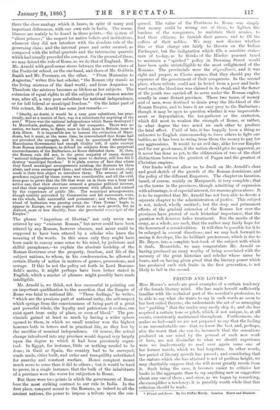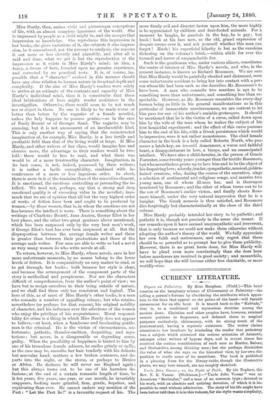FRIEND AND LOVER.*
Miss HARDY'S novels are good examples of a certain tendency of the female literary mind. She has made herself sufficiently familiar with the technical part of the novelist's profession, to be able to say what she wants to say in such words as seem to her best suited thereto; she understands the art of so arranging her " padding " that the reader may easily skip it; and she has acquired a certain tone or pitch, which, if not unique, is, at all events, consistently maintained throughout. Furthermore, she makes us feel—and we are not prepared to say that the feeling is an uncomfortable one—that we know the best and, perhaps, also the worst that she can do, insomuch that the sensations produced on our mind by the perusal of each new work of hers, are not dissimilar to what we should experience were we inadvertently to read over again some one of her former novels, which we had forgotten. In other words, her period of literary growth has passed ; and considering that the stature which she has attained is not of perilous height, we may charitably suppose that she will never greatly recede from it. Such being the case, it becomes easier to criticise her books in the aggregate than to say anything new or suggestive about any one of them ; and since, as we began by remarking, she exemplifies a tendency, it is possibly worth while that this criticism should be made.
• Friend and Lover. By ha Daffus Hardy. London Hurst and Blackett.
Miss Hardy, then, unites vivid and picturesque conceptions of life, with an almost complete ignorance of the world. She is impressed by people as a child might be, and she accepts that impression as knowledge. She reproduces this impression in her books, she gives variations of it, she subjects it (the impres- sion, be it remembered, not the person) to analysis, she reasons it out more or less cleverly and plausibly, and after all is said and done, what we get is but the reproduction of the impression as it exists in Miss Hardy's mind; an idea, a fancy, a dream of hers, founded upon no genuine experience, and corrected by no practical tests. It is, of course, im- possible that a " character " evolved in this manner should have any close relation to human nature in its actual depth and complexity. If the aim of Miss Hardy's readers were solely to arrive at an estimate of the contents and capacity of Miss Hardy's individual mind, then it is conceivable that these ideal fabrications of hers might render assistance in the investigation. Otherwise, there would seem to be not much use or object in them. No one is likely to be made worse or better than before by the vagaries of a female novelist, unless the lady happens to possess genius,—as in the case of Emily BrontZ or of Georges Saud. The vagaries may be amusing, but it is not amusement of an inexhaustible kind. This is only another way of saying that the uninstructed imagination of, for example, Miss Hardy, is a less fertile and profitable field than that of the living world at large. If Miss Hardy, and other writers of her class, would imagine less and observe more, the advantage to their readers would be. two- fold : there would be less to read, and what there was would be of a more trustworthy character. Imagination, in its best sense, is not, indeed, possessed by these writers ; it is rather a facile susceptibility, combined with in- ventiveness of a more or less ingenious order. In short, there is more in it of the feminine than of the masculine element. It is emotional, the emotions controlling or persuading the in- tellect. We need not, perhaps, say that a strong and deep emotional quality is of exceeding value to the novelist; inso- much that we are of opinion that all but the very highest order of works of fiction have been and ought to be produced by women,—by those women, that is, in whom the emotions are not less because the intellect is more. There is something about the writings of Charlotte Brontë, Jane Austen, George Eliot in her best phase, and the other two great geniuses above mentioned, which has been surpassed only by the very best men's work, if George Eliot's best has ever been surpassed at all. But the disproportion between the average female writer and these is greater than between their productions and those of the average male writer. Few men are able to write so bad a novel as very many women do who write novels at all.
To return, however, to Miss Hardy, whose novels, save in her more unfortunate moments, by no means belong to the lower levels of fiction. It is comparatively an easy matter to read, or to get through, her books ; both because her style is clear, and because the arrangement of the component parts of the story is methodical and perspicuous. Nor are the characters difficult of comprehension, from the author's point of view; we have but to resign ourselves to their being outside of nature, and we shall find them only too consistent and logical. The hero of this, as of most of Miss Hardy's other books, is a man who commits a number of appalling crimes ; but who retains, nevertheless (or perhaps for that reason), his original nobility of character, and his influence over the affections of the women who enjoy the privilege of his acquaintance. Moral responsi- bility for crime is a thing in which Miss Hardy does not appear to believe,—at least, when a handsome and fascinating gentle- man is the criminal. He is the victim of circumstances, un- fortunate, pathetic, thunder-smitten, despairing, and mys- terious; but never, in a disagreeable or degrading sense, guilty. When the possibility of happiness is hinted to him by one of his tremulous female adorers, he smiles grimly or sadly, as the case may be, smooths her hair tenderly with his delicate but muscular hand, mutters a few broken sentences, and de- parts into the night, or the storm, or perhaps to Mexico or Africa. He declares he will never see England again ; but this always turns out to be one of his harmless de- lusions ; at the end of a certain romantic length of time, be it ten years, five years, one year, or one month, he invariably reappears, looking more grizzled, firm, gentle, hopeless, and captivating than ever. He cannot endure any mention of the Past " Let the Past lie!" is a favourite request of his. The
more firmly evil and disaster fasten upon him, the more highly is he appreciated by children and four-footed animals. For a moment he laughs, he gambols in the hay, he is gay ; but hush ! look at his face now, as the old, grand expression of despair creeps over it, and ask yourself whether this man can forget ! Hush ! his superficial hilarity is but as the sunshine flickering on the volcano's brink,—within abide for ever the turmoil and terror of unquenchable fire.
Such is the gentleman who, under various aliases, constitutes the centre of interest of Miss Hardy's novels, and who, in the present instance, is known as Richard Rossmore. We are sure that Miss Hardy would be painfully shocked and distressed, were some unfortunate accident to bring her into contact with a per- son whose life had been such as she describes Mr. Rossmore's to have been. A man who commits two murders is apt to be something more than unfortunate, and something less than re- spectable. However, as Mr. Rossmore resembles the every-day human being as little in his general manifestations as in this particular of immaculate murderousness, we are content to let him pass for one of his author's amiable grotesques. It should be mentioned that he is the victim of a curse, called down upon him by the wife of the man whom he makes the subject of his first homicidal experiment ; and the effect of this curse pursues him to the end of his life, with a Greek persistence which would be impressive, were it not rather monotonous. The chief female character in the book is a lady called Roberta North, who pos- sesses a latch-key, an ice-cold demeanour, a warm and faithful heart, a disappointment in love, a biceps, and an emancipated intellect. We have also a child-heroine, in the person of Gracie Forrester, some twenty years younger than the terrific Rossmore, but who nevertheless grows up to love him and to be the object of his despairing love; alovely, tender, sympathetic, musical, golden- haired creature, who, during the course of the narrative, sings a selection of sentimental and religions songs, and marries two young men, one of whom ill-uses her, and is thereupon murdered by Rossmore ; and the other of whom turns out to be the son of Rossmore's earlier victim, and finally shoots Ross- more himself, under the very natural impression that he is a burglar. The Greek nemesis is thus satisfied, and Rossmore dies forgivingly but characteristically at the close of the third volume.
Miss Hardy probably intended her story to be pathetic ; and pathetic it is, though not precisely in the sense she meant. If our remarks upon it have seemed unsympathetic and irreverent, that is only because we could not make them otherwise without adopting the author's theory of the world. We fully appreciate her own faith and seriousness, and only regret that these should be so powerful as to prompt her to give them publicity. However, there is no great harm done, for Miss Hardy will have to plead even more convincingly than she does here before murderers are received in good society ; and meanwhile, we will hope that she will become either less charitable, or more worldly-wise.



































 Previous page
Previous page